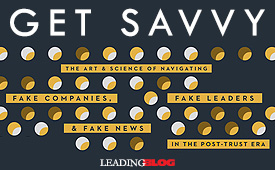 |
 |
06.12.09

Think Again: Why Good Leaders Make Bad Decisions
WHY DO GOOD LEADERS make bad decisions? This question is at the heart of Sydney Finkelstein, Jo Whitehead and Andrew Campbell’s book, Think Again. The authors begin their analysis with the notorious 2005 hurricane Katrina disaster. As the retelling of the events are explained, you might even find yourself compelled to stop waving your placard, change your t-shirt, pull up a chair and listen for understanding. A series of understandable mistakes—errors of judgment—were made by very competent people. The same kinds of errors of judgment that we all make. A bad decision starts with at least one influential person making an error of judgment. But normally, the decision process will save the day: facts will be brought to the table that challenge the flawed thinking, or other people with different views will influence the outcome. So the second factor that contributes to a bad decision is the way the decision is managed: for whatever reason, as the decision is being discussed, the erroneous views are not exposed and corrected.Drawing on the findings of brain research, they conclude that “our brains use two processes that enable us to cope with the complexities we face: pattern recognition and emotional tagging.” Neither of these is inherently bad, in fact, they are quite helpful and necessary much of the time. The problem is when we are faced with new types of input that do not match up with our previous experiences. This most often leads to flawed thinking. They describe four conditions under which flawed thinking is most likely to happen. The first two are pattern recognition problems and the latter are emotional tagging issues.
  
Posted by Michael McKinney at 09:34 AM
|
BUILD YOUR KNOWLEDGE
 

How to Do Your Start-Up Right STRAIGHT TALK FOR START-UPS 
Grow Your Leadership Skills NEW AND UPCOMING LEADERSHIP BOOKS 
Leadership Minute BITE-SIZE CONCEPTS YOU CAN CHEW ON 
Classic Leadership Books BOOKS TO READ BEFORE YOU LEAD |